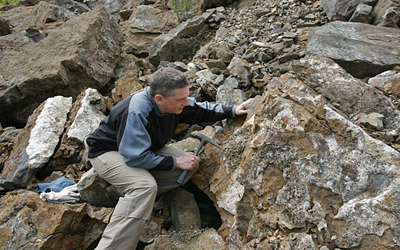Courses


 Compare
Compare
Geology: An Overview Geology is the scientific study of the Earth, its structure, materials, processes, and the forces that shape it. It involves understanding how the Earth's components—such as rocks, minerals, soil, and water—interact with each other over geological time scales. Geology combines aspects of physics, chemistry, biology, and environmental science, making it a multidisciplinary field that covers the Earth's history, structure, and processes. Geology has applications in various industries, including natural resource exploration (oil, gas, minerals), environmental protection, water resources management, and understanding natural hazards like earthquakes, volcanoes, and landslides. Course Outline for Geology 1. Introduction to Geology o Overview of Geology and Its Importance o History of Geological Studies o Branches of Geology: Physical Geology, Historical Geology, Environmental Geology, etc. o Role of Geologists in Society o Tools and Techniques in Geology 2. Earth Materials: Minerals and Rocks o Mineral Properties and Identification o Classification of Rocks: Igneous, Sedimentary, and Metamorphic Rocks o The Rock Cycle o Formation, Characteristics, and Uses of Rocks and Minerals o Laboratory: Rock and Mineral Identification 3. Geological Time and Earth History o Understanding Geological Time Scales o Fossils and Evolution of Life o Principles of Stratigraphy and Dating Techniques o Geochronology: Radiometric Dating Methods o Earth's History: Major Geological Eras, Periods, and Events 4. Plate Tectonics and Earth's Structure o Structure of the Earth: Crust, Mantle, Core o Plate Tectonics Theory: Continental Drift, Sea-Floor Spreading o Types of Plate Boundaries: Divergent, Convergent, and Transform o Earthquakes and Volcanism o Formation of Mountain Ranges and Ocean Basins o Laboratory: Plate Tectonics Models 5. Geomorphology: Study of Landforms o Weathering, Erosion, and Deposition Processes o River Systems and Fluvial Geomorphology o Glacial and Coastal Geomorphology o Deserts and Arid Landforms o Laboratory: Topographic Map Interpretation 6. Hydrogeology and Environmental Geology o Water Cycle and Groundwater Flow o Aquifers and Water Resources Management o Soil and Sediment Analysis o Environmental Geology: Pollution, Waste Management, and Remediation o Climate Change and Its Geological Impacts o Laboratory: Groundwater Flow Models 7. Economic Geology and Natural Resources o Mineral Exploration and Mining Techniques o Geology of Oil and Gas Reservoirs o Renewable and Non-Renewable Resources o Sustainable Resource Management o Laboratory: Resource Exploration Techniques 8. Geological Mapping and Field Studies o Methods of Geological Mapping o Interpreting Geological Maps and Cross-Sections o Field Techniques: Rock Sampling, Mapping, and Data Collection o Field Trips: Understanding Local Geology o Laboratory: Geological Map Interpretation 9. Geological Hazards and Risk Management o Understanding Earthquakes, Volcanic Eruptions, Landslides, and Tsunamis o Risk Assessment and Mitigation Strategies o Role of Geologists in Disaster Management o Laboratory: Earthquake Simulation Models 10. Geology Research and Applications o Geological Data Analysis and Interpretation o Applications of GIS and Remote Sensing in Geology o Research Methodologies in Geology o Capstone Project: Case Studies of Geological Phenomena o Presentation and Report Writing Skills ________________________________________ Expectations of Geology Students 1. Understanding Core Concepts: Students are expected to gain a deep understanding of geological processes, Earth's history, and the formation of rocks and minerals. This foundational knowledge is crucial for interpreting natural phenomena and solving geological problems. 2. Fieldwork and Practical Skills: Geology is a hands-on discipline, and students should be prepared for fieldwork, which may involve rock sampling, geological mapping, and studying various landforms in natural settings. Practical skills in using geological tools like rock hammers, GPS, and compasses are important. 3. Laboratory Proficiency: Students should be adept at conducting laboratory analyses, such as identifying minerals under microscopes, analyzing rock samples, and using models for understanding geological processes like groundwater flow or plate tectonics. 4. Research and Analytical Thinking: Students are expected to develop strong research skills, including the ability to analyze data, interpret geological maps, and conduct field-based research. Analytical thinking is essential for understanding complex geological phenomena. 5. Communication Skills: Effective communication of geological findings through reports, presentations, and technical diagrams is critical. Students should be able to clearly convey scientific information to both technical and non-technical audiences. 6. Environmental Awareness: With geology's strong connection to environmental issues, students should develop a keen awareness of how geological processes affect ecosystems, climate, and human activities. This includes understanding the implications of natural resource extraction and managing geological hazards.
0 Lessons
Hours

 Compare
Compare
Geosciences, also known as Earth Sciences, encompass the study of the Earth, its composition, structure, processes, and the physical phenomena that shape our planet. This field involves the investigation of the Earth’s atmosphere, hydrosphere, biosphere, and geosphere, extending from the Earth's core to the outer layers of its atmosphere. Geosciences play a critical role in understanding natural resources, environmental challenges, and the dynamic processes that influence the Earth’s surface and interior. Core Disciplines within Geosciences Geosciences are broad, encompassing several key disciplines: 1. Geology: o Focuses on the solid Earth, studying rocks, minerals, and the processes that form and alter them over time. It involves understanding Earth’s history through fossils and geological formations, investigating tectonic activity, and studying natural hazards like earthquakes and volcanoes. o Geology is central to exploring and managing natural resources such as minerals, oil, and gas. 2. Geophysics: o Uses physical principles to study the Earth’s interior structure and processes, including seismic activity, magnetic fields, and gravity. o Geophysics helps in understanding the Earth's subsurface, making it crucial for oil exploration, geothermal energy production, and earthquake research. 3. Hydrology: o Examines the distribution, movement, and quality of water on Earth, including groundwater, rivers, lakes, and oceans. o Hydrologists study the water cycle, water resources, and the impact of human activities on water systems, playing a vital role in water resource management and flood prevention. 4. Oceanography: o Investigates ocean systems, studying ocean currents, waves, marine life, and the chemical composition of seawater. o Oceanography is critical for understanding climate regulation, marine ecosystems, and the impact of human activities on oceans, including pollution and global warming. 5. Meteorology and Climatology: o Focus on the Earth’s atmosphere, studying weather patterns, climate change, and atmospheric processes. o Meteorologists forecast weather conditions, while climatologists study long-term climate trends and their effects on the environment. 6. Environmental Geoscience: o Combines aspects of geology, biology, chemistry, and physics to understand the interactions between humans and the natural environment. o It addresses issues like pollution, waste management, natural resource conservation, and the impacts of climate change on ecosystems. 7. Soil Science: o Studies soil as a natural resource, focusing on soil formation, classification, mapping, and its physical, chemical, and biological properties. o Soil science is essential for agriculture, land management, and understanding the role of soils in supporting ecosystems. Applications of Geosciences Geosciences have a wide range of applications that impact various aspects of human life, industry, and the environment: • Resource Exploration and Management: Geoscientists are integral to the discovery and sustainable management of natural resources, such as fossil fuels, minerals, and groundwater, which are essential for energy production, construction, and other industrial activities. • Environmental Protection and Climate Change: Geoscientists study the impact of climate change, pollution, and other environmental challenges. Their research supports efforts to mitigate the effects of global warming, manage natural disasters, and protect ecosystems. • Natural Disaster Prediction and Management: By understanding geological processes, geoscientists contribute to the prediction and mitigation of natural disasters like earthquakes, tsunamis, landslides, and volcanic eruptions. Their work is vital for disaster preparedness and risk reduction strategies. • Engineering and Construction: Geoscientists provide crucial data for the design and construction of infrastructure, such as roads, dams, tunnels, and buildings, ensuring that structures are built on stable ground and considering geological risks. • Renewable Energy: Geosciences play a role in the exploration and development of renewable energy sources like geothermal energy, hydropower, and the study of wind and solar energy patterns. Research Methods in Geosciences Geosciences use a variety of methods to study Earth’s systems: • Field Studies: Geoscientists often conduct fieldwork to collect samples, map geological formations, and observe natural processes in their environments. • Laboratory Analysis: Rocks, minerals, water, and soil samples are analyzed in laboratories to determine their chemical composition, age, and physical properties. • Remote Sensing and GIS: Technologies like satellite imagery, drones, and Geographic Information Systems (GIS) are used for mapping, analyzing spatial data, and monitoring changes in the Earth’s surface. • Geophysical Surveys: Techniques such as seismic surveys, magnetic and gravity surveys, and ground-penetrating radar help explore subsurface structures without the need for direct excavation. Importance of Geosciences Geosciences are fundamental to understanding our planet's past, present, and future. They provide insights into how the Earth has evolved over billions of years, how natural systems function, and how human activities influence the environment. This knowledge is crucial for managing natural resources sustainably, reducing the impacts of environmental hazards, and adapting to a changing climate. Geosciences play a critical role in shaping policies for sustainable development, disaster resilience, and the responsible use of Earth’s resources, ultimately contributing to the well-being of society and the planet
0 Lessons
Hours

 Compare
Compare
Brief Description of Electrical and Electronics Engineering Electrical and Electronics Engineering (EEE) is a dynamic field focused on the study, design, and application of electrical systems, circuits, and electronic devices. This discipline encompasses a wide range of technologies and principles that enable the generation, transmission, distribution, and utilization of electrical energy. Students will explore fundamental concepts of electrical engineering, including circuit theory, signal processing, control systems, and microelectronics. Applications of EEE are diverse and impactful, ranging from power generation and distribution to telecommunications, consumer electronics, renewable energy systems, and automation technologies. Students will gain hands-on experience with various tools and technologies, preparing them for careers in industries that drive innovation and improve everyday life. Throughout the program, students can expect to learn: Fundamentals of Circuit Design: Analyzing and designing electrical circuits using various components. Electromagnetic Theory: Understanding the principles of electromagnetism and their applications in devices and systems. Signal Processing: Techniques for analyzing and manipulating signals for effective communication. Power Systems: Principles of power generation, transmission, and distribution, with a focus on renewable energy sources. Automation and Control: Designing systems for automated processes, enhancing efficiency in various industries. This comprehensive education equips students with the skills necessary to excel in a rapidly evolving technological landscape.
₦50000
0 Lessons
Hours

 Compare
Compare
The Mechanical Engineering course offers a comprehensive study of the design, development, and manufacturing of mechanical systems and devices. It provides a solid foundation in core engineering principles, including mechanics, thermodynamics, materials science, and fluid dynamics. Students learn to design and analyze components, machines, and systems, focusing on real-world applications in diverse industries such as automotive, aerospace, robotics, manufacturing, energy, and HVAC systems. Emphasizing hands-on learning and advanced simulations, the course covers CAD modeling, prototyping, and precision manufacturing processes. Additionally, students explore innovations in automation, renewable energy solutions, and thermal management systems, preparing them to tackle contemporary challenges in sustainable design and high-efficiency engineering. The course integrates cutting-edge technology and industry standards, equipping graduates with the technical skills and problem-solving capabilities needed for success in a dynamic and evolving field.
3 Lessons
Hours

 Compare
Compare
Studying Engineering Courses at Curtis Engineering Academy Engineering courses are vital in today's industry because they drive innovation, problem-solving, and sustainable development. Engineers design solutions for challenges like infrastructure, energy, water supply, and digital transformation, making them central to advancing technology and improving quality of life. The demand for engineers spans sectors such as renewable energy, artificial intelligence, and water management, highlighting their importance in adapting to climate change and evolving digital economies. Studying Engineering at Curtis Engineering Academy offers a unique advantage, combining technical expertise with hands-on training and research. The Academy's commitment to cutting-edge facilities and global partnerships ensures that students gain industry-relevant skills and access to advanced technologies. Curtis Engineering Academy aims to bridge the gap between academia and practical application, preparing graduates to be leaders in engineering innovation and contributing to sustainable solutions for local and global challenges.
0 Lessons
Hours

 Compare
Compare
Learn Facebook marketing with our comprehensive course! Over 9 hours of step-by-step video content take you from novice to pro. Master strategies for lead generation, sales, and even job opportunities. Dive deep into dynamic creative testing and learn to decipher profitable data columns. Become a Facebook marketing and ads expert today!
1 Lessons
00:01:34 Hours

 Compare
Compare
The Mobile Video and Photo Editing digital course is designed to empower enthusiasts and professionals alike with the skills and knowledge to create stunning visual content using just their smartphones.
2 Lessons
00:10:08 Hours

 Compare
Compare
Course Title: Digital Marketing Essentials Description: This course teaches core digital marketing strategies like SEO, PPC, social media, email, content, analytics, and mobile marketing. Ideal for marketers and entrepreneurs seeking practical skills in the digital realm. Enroll now to master the essentials of digital marketing and drive business success.
1 Lessons
02:00:00 Hours